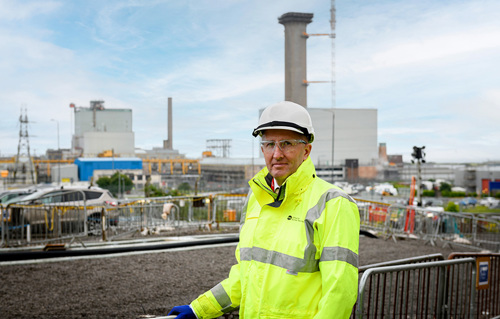The performance of Britain’s nuclear industry remained satisfactory in 2023/24, with most inspections confirming good levels of compliance, the Chief Nuclear Inspector (CNI) has today announced.
Overall the sector continues to meet the high standards of safety, security, and safeguards expected, but sustained improvements remain necessary in some areas, according to CNI Mark Foy of the Office for Nuclear Regulation (ONR).
In his annual industry report, Mark Foy says last year's introduction of cyber security as a key regulatory priority produced positive results, with fewer higher significance cyber security incidents reported, while noting the need for continued investment to guard against evolving threats.
Work is ongoing to improve conventional health and safety risk management. Incident reporting trends in this area increasing during the past year - reflecting sector growth and activity, particularly in construction and demolition.
The Chief Nuclear Inspector’s report highlights many positive achievements across the sector during 2023/24 including:
- the start of two new Generic Design Assessments (GDAs) on the Holtec International SMR-300 and GE Hitachi BWRX-300 designs, alongside the progress of the Rolls-Royce Small Modular Reactor (SMR) GDA through Step 2;
- the first ever full decommissioning of a UK reactor site under modern regulatory controls at the Imperial College Reactor Centre in Ascot;
- the International Atomic Energy Agency’s annual review confirming the UK met all safeguards obligations, with exemplary performance noted from ONR as the state regulatory authority;
- ONR overseeing Hunterston B station becoming more than 50% defuelled, with Reactor 3 completing defuelling last September and Reactor 4 underway, and Hinkley Point B station approaching 50% defuelled; and
- a trilateral agreement between ONR and the US and Canadian nuclear regulators to facilitate greater collaboration on new reactor design assessment to accelerate timeframes and reduce overall regulatory burden.
In areas where performance did not meet the expected standards during 2023-2024, ONR held the industry to account to influence improvements.
This included a focus on sites that were subject to enhanced or significantly enhanced regulatory attention - with the attention levels detailed in this year’s report.
This year’s report also features a summary of a detailed review into the impact of ONR’s regulation on the design of the Hinkley Point C (HPC) plant, which is under construction in Somerset.
The review was commissioned by ONR in light of a wider public debate around the role of regulation in the delivery of Britain’s nuclear ambitions. It was carried out in collaboration with NNB GenCo (EDF) who are delivering the project.
Our analysis shows that 82 high-level design changes were agreed with ONR when the UK EPR reactor was approved in 2012, leading to meaningful improvements to nuclear safety, although we accept that these led to further downstream modifications.
And it is estimated that the volumes of additional concrete and steel that were required at HPC due to ONR’s regulatory requirements were less than 5%.

Mark Foy said: “With major infrastructure investment taking place across the UK’s civil and defence nuclear sectors, we will exercise a proportionate approach to our regulation and seek to enable industry ambitions, while ensuring it continues to meet the fundamental standards of safety and security.
"Overall performance of the industry remained satisfactory during the 2023/24 reporting year with strong standards of safety and security being seen by ONRs inspectors.
"However, the last year has demonstrated the need for further improvements and committed efforts to remedy specific shortfalls within the sector, which requires carefully-directed strategic oversight.
“This includes industry demonstrating that it is planning for the management of the whole life cycle, so that facilities have adequate investment and plans to maintain the assets in a safe condition, and allow timely decommissioning and dismantling.
“Our focus will continue on these areas with expectations for short, medium and long-term progress.”
Speaking about the review into design changes at Hinkley Point C, Mark added: “As the UK nuclear regulator, the protection of society is our priority and is always the fundamental consideration underpinning our decisions.
“We carried out this review in the context of a wider debate around the role of regulation in the delivery of the nation’s nuclear ambitions.
“We have a strong relationship with NNB GenCo (EDF) who are delivering the project and worked collaboratively with them on the review to understand their source data and develop our findings.
“Based on this work, we are confident the design changes we influenced in 2012 were necessary, and our approach was proportionate and consistent with established international good practice in order to protect workers and the public.
“Our inspectors have an established presence on the HPC site and will continue to maintain targeted and proportionate oversight as the project transitions from civil construction to mechanical equipment installation.
“We will continue to enable the UK’s energy ambitions, while ensuring the fundamental standards of nuclear safety and security are met.”